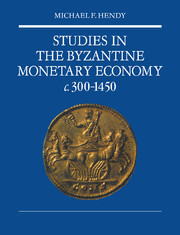Book contents
- Frontmatter
- Contents
- List of plates
- List of maps
- List of tables
- Abbreviations
- Preface and acknowledgements
- Introduction
- SECTION I ECONOMY AND SOCIETY
- SECTION II FINANCE
- SECTION III COINAGE (CIRCULATION)
- 5 Supply
- 6 Supervision
- SECTION IV COINAGE (PRODUCTION)
- Preliminary observations, future directions
- Bibliographies
- Key to plates
- Indexes
- Plate section
6 - Supervision
Published online by Cambridge University Press: 05 November 2011
- Frontmatter
- Contents
- List of plates
- List of maps
- List of tables
- Abbreviations
- Preface and acknowledgements
- Introduction
- SECTION I ECONOMY AND SOCIETY
- SECTION II FINANCE
- SECTION III COINAGE (CIRCULATION)
- 5 Supply
- 6 Supervision
- SECTION IV COINAGE (PRODUCTION)
- Preliminary observations, future directions
- Bibliographies
- Key to plates
- Indexes
- Plate section
Summary
GENERAL
Once in circulation the gold coinage, in particular, was subject to strict supervision, being on the one hand peculiarly liable to attack because it was composed of the most valuable metal available and therefore was capable of yielding the greatest degree of profit to those who were prepared to risk tampering with it, and being on the other of crucial importance to the state which had increasingly based its finances upon it.
The general case against tampering with the coinage is well enunciated by Cassiodorus in his formula for the appointment of a procurator monetae: ‘Yet it is necessary for complete integrity to be sought in the case of the coinage, on which Our face is impressed, and which is also ascertained to be of general utility (ubi et vultus noster imprimitur et generalis utilitas invenitur).’
The most obvious (and evidently the commonest) method of tampering with the gold coinage was to pare or clip it down, and this is mentioned in private documents of both the fourth century (an attempt to arrange a meeting to clip down coinage [to logarin perikoptein]), and the thirteenth (a sum of clippings of hyperpyra [taiaturis iperperorum]). According to Procopius, the logothete Alexander was nicknamed ‘the scissors (to psalidion)’ from the skill with which he clipped down nomismata without altering their appearance, in the sixth century, and, according to The Book of the Prefect, metropolitan trapezitai were not: ‘to file (xeein), or clip down (temnein), or counterfeit (parakharattein) nomismata or miliaresia’ in the tenth.
- Type
- Chapter
- Information
- Studies in the Byzantine Monetary Economy c.300–1450 , pp. 316 - 368Publisher: Cambridge University PressPrint publication year: 1985



